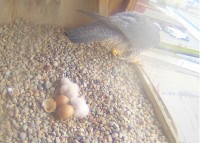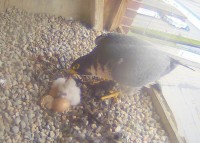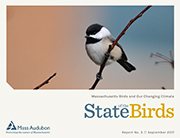Lawrence Peregrines: 2 hatchlings!!!!!
May 14, 2018 in In the Nest Box, lawrence peregrines, Peregrine Falcons Eastern Massachusetts, Peregrine Falcons Massachusetts
This morning started off with overcast skies, wind from the south at 5MPH, and temp at 53F. The forecast for the day ahead calls for mostly sunny skies, with a high near 75. Southwest wind 3 to 7 mph.
 Looks like the second egg hatched last evening! At 5:45 AM this morning, the female was observed nestled over the hatchlings and two remaining eggs. One of the little fluff balls was seen peeking out from underneath the mother’s protective cover. At 6:07 AM, the female rose up, walked to edge of nest box and departed, showing the two hatchlings and two remaining eggs. She returned within a minute with fresh prey in her talons. It was a small dark bird, but unable to make a positive identification.
Looks like the second egg hatched last evening! At 5:45 AM this morning, the female was observed nestled over the hatchlings and two remaining eggs. One of the little fluff balls was seen peeking out from underneath the mother’s protective cover. At 6:07 AM, the female rose up, walked to edge of nest box and departed, showing the two hatchlings and two remaining eggs. She returned within a minute with fresh prey in her talons. It was a small dark bird, but unable to make a positive identification.
 She spent a few minute tearing off the feathers, and then at 6:15 AM, she started to feed the little ones. She rips up very small pieces and carefully feed the chicks. She took her time and the chicks gobbled up all that was offered. Just before 6:30 AM, the female grabbed the remains in her bill, and departed the nest to dispose of the carcass.
She spent a few minute tearing off the feathers, and then at 6:15 AM, she started to feed the little ones. She rips up very small pieces and carefully feed the chicks. She took her time and the chicks gobbled up all that was offered. Just before 6:30 AM, the female grabbed the remains in her bill, and departed the nest to dispose of the carcass.
Now let’s take a look at an overview of growth and development over the next 40 days. Here’s a bit of what to expect:
At 5 days after hatch, their mass has doubled. The eyas can sit with relative ease, and the open eyes are more round.
At 6–8 days of age the second down (mesoptile or preplumulae) starts to emerge, first on humeral and alar tracts but no down visible on belly at 6 day, although on the legs and belly at 8 days. Also second down is well out on the wings and looks a bit blueish and sheaths of primaries breaking skin on wings.
By 10 days of age the second down is complete and uniform and outer rectrices are breaking skin. At 10 days, primaries growing at 2–3 mm/d, rectrix sheath not yet split.
At 14 days the second down is dense and long, rectrix sheath about 2 mm and typically ninth primary emerges from sheath.
By day 17 the contour feathers start to push out prepennae and only pale (buffy) tips of rectrices have emerged but growing at about 2 mm/d (since day 13).
By 10 days of age the second down is complete and uniform and outer rectrices are breaking skin. At 10 days, primaries growing at 2–3 mm/d, rectrix sheath not yet split.
At 14 days the second down is dense and long, rectrix sheath about 2 mm and typically ninth primary emerges from sheath.
By day 17 the contour feathers start to push out prepennae and only pale (buffy) tips of rectrices have emerged but growing at about 2 mm/d (since day 13).
At 20 days while still with heavy coat of second down, brown contour feathers are visible on margins of wings, tail, and faintly around the eyes.
By 30 days young appears about half down-covered and half feathered; while side of face well feathered, crown still covered with down.
At 35 days while mostly feathered, large conspicuous patches of down around legs, under wings, and on crown.
At 40 days almost fully feathered with traces of down on crown and under wings and outer several remiges; rectrices not fully grown but bird capable of weak flight.
Literature cited:
Veldhuis, Froona, Eyases growth and development http://falcoperegrinus-froona.blogspot.com/2008/04/eyases-growth-and-development.html
